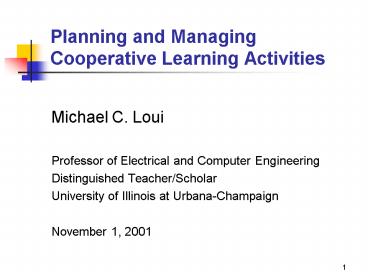Planning and Managing Cooperative Learning Activities - PowerPoint PPT Presentation
1 / 12
Title:
Planning and Managing Cooperative Learning Activities
Description:
I seek differences of opinion to enrich the discussion. I stick to the subject and avoid dominating the discussion with long stories ... – PowerPoint PPT presentation
Number of Views:409
Avg rating:3.0/5.0
Title: Planning and Managing Cooperative Learning Activities
1
Planning and Managing Cooperative Learning
Activities
- Michael C. Loui
- Professor of Electrical and Computer Engineering
- Distinguished Teacher/Scholar
- University of Illinois at Urbana-Champaign
- November 1, 2001
2
Forming Groups
- Types of cooperative groups
- Informal groups within a class period
- Teams for a project lasting several weeks
- Base groups (learning teams) for entire term
- Size tradeoffs
- Smaller groups better participation, individual
accountability, easier to schedule meetings - Larger groups more ideas, more complex tasks
- Magic number 4
3
Top Ten Reasons for Instructor-Assigned Teams for
Term Projects
- 10. Research shows students satisfaction is
significant-ly higher than when students choose
own teams - 9. Heterogeneous teams draw on a broader base
of skills and knowledge - 8. Its fairer to all students the instructor
ensures each team has someone with a particular
skill - 7. Students learn to work with people who have
different backgrounds and culturesan important
skill for working in the real world - 6. Students make new friends
4
Top Ten Reasons for Instructor-Assigned Teams for
Term Projects
- 5. Students can be more objective and avoid
conflicts of interest when they evaluate each
other at the end of the project - 4. Because teams are diverse, students gain
personal satisfaction from teaching other
students what they know, and learning from other
students - 3. Students are less likely to socialize too much
- 2. If a team fails, students can blame the
instructor instead of themselves - 1. But teams wont fail!
5
Forming Long-Term Teams
- Survey individual skills and learning/working
styles to assign students to heterogeneous teams - Example Proficiency in C programming
- None Fair Good Awesome
- Example Preference for theory or experiments
- For project teams, if possible, wait until
mid-semester (after drop date, midterm exams)
6
Group Roles
- Typical roles
- Facilitator Explainer
- Timekeeper Checker
- Recorder Researcher/Runner
- Reporter
- Or Chief Executive Officer, Executive Vice
President, Comptroller, etc. - In a long-term team, roles should rotate from one
week to the next
7
Managing Groups and Teams
- Monitor long-term teams
- Meetings during class periods
- Schedule with milestones
- Weekly progress reports
- Help students learn how to work in groups
discuss potential problems beforehand - Assert overall values and norms
- No flaming
- No racist or sexist remarks
8
Credo for Group Work
- I encourage everyone to participate
- I seek differences of opinion to enrich the
discussion - I stick to the subject and avoid dominating the
discussion with long stories - I restate what someone has said if it is unclear
to me - I summarize the last speaker before I speak
- I criticize ideas, not people
- I try to understand all sides of an issue
- I change my mind when the evidence is compelling
- I focus on reaching the best decision, not on
winning - (Based on Barbara Gross Davis, Tools for Teaching)
9
Conflict Resolution
- Mediator should listen actively
- If I understand you correctly, you are saying
- Acknowledge emotions, find facts
- Cast the conflict as a problem to be solved
- Negotiate over interests, not positions
- Position We should write the first draft this
week - Interest Ill have less time next week
- Invent options to meet everyones interests
10
Illustrative ActivityThree-Step Interview
- Form three pairs in your group
- Step 1 In each pair, one person interviews the
other (5 minutes) - Step 2 In each pair, the interviewer and partner
switch roles (5 minutes) - Step 3 Each person shares the partners
responses with the whole group (10 minutes)
11
Illustrative ActivityUncommon Commonalities
- Facilitator and recorder
- On the worksheet, list attributes and interests
that members in your group have in common (10
minutes) - Using this information, negotiate a name for your
group (10 minutes)
12
Homework
- Determine which group members will be responsible
for leading a discussion of each chapter of
Millis and Cottell on November 8 (15 minutes for
each of three chapters) - Chapter 6, Structures for Problem Solving in
Teams (1 or 2 members) - Chapter 7, Basic Paired Teaching (2 members)
- Chapter 8, Reciprocal Teaching (2 members)
- November 8 Jigsaw































